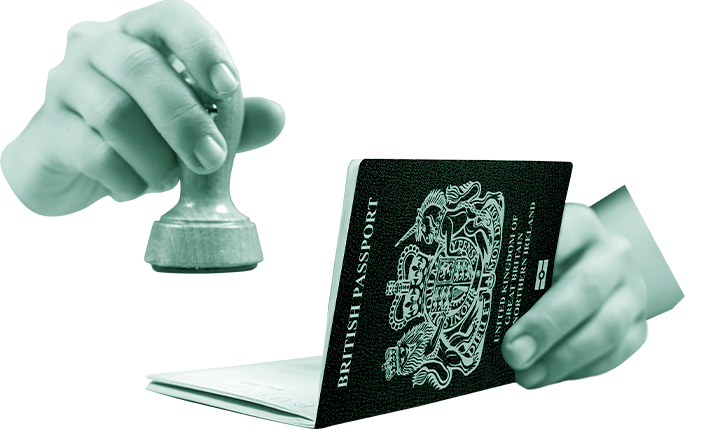Let's Talk

Need Help Urgently?
Call our 24 hour rapid response team now on 0333 311 1090
Request a callback
"*" indicates required fields


The UK Graduate Trainee visa is a good chance for recent grads working in big companies to grow their careers in the UK. The Home Office manages this visa. It helps these grads get useful work experience from a training program at their employer’s UK branch. This article will guide you through everything about this visa. It will make the trainee visa application process easier for you.
The UK Graduate Trainee visa is part of the Global Business Mobility routes. This visa lets overseas companies send graduate employees to their UK offices for a short time. It is meant for those in a graduate training program. This program helps them prepare for senior management or specialized jobs in their companies.
With this visa, international graduates can gain experience in the UK job market. They also help their employer’s global operations. This shows that the UK wants to attract good talent from around the world. It also helps boost economic growth through cooperation on a global level.
A UK Graduate Trainee visa lets a graduate trainee come to the UK and work for a sponsor company for a set time. This visa is meant for workers at multinational companies who are in a formal graduate training program.
This trainee route is part of the larger Global Business Mobility visa category run by the Home Office. Its goal is to help skilled workers move within companies around the world. This encourages sharing knowledge and building business connections.
The main goal of this visa is to give the graduate trainee real skills and knowledge through a well-structured training program. This program should help the trainee move towards a senior management or specialist role in the company.
The visa application process has important steps. It starts when a graduate trainee gets a spot in their company’s UK graduate training program.
First, the UK employer must get a sponsorship license from the Home Office if they do not have one already. Once the employer has this license, they can give a certificate of sponsorship to the graduate trainee.
Next, the graduate trainee must fill out the online visa application. They will also need to pay the fees and go to a biometrics appointment at a specific visa application center.
To apply for a UK Graduate Trainee visa, you need to meet some important criteria. These rules make sure that people are truly part of a company-sponsored training program and have what they need to benefit from it.
First, you must be working for a company that has a UK branch or subsidiary. You should have been employed with this company outside the UK for at least three months before you apply. This rule shows that you have a good relationship with your employer and you are committed to the work of the organization worldwide.

To apply for a graduate training program, you do not need a specific degree, but your qualifications must be relevant to the job. For example, if you want to join a finance program, having a degree in finance, economics, or a similar area would be helpful.
According to the skilled worker visa rules, your job must fit a specific occupation code from the Home Office guidelines. This code shows that the job meets the required skill level for the visa.
Additionally, the job should be at a graduate level. This means it should need skills comparable to a bachelor’s degree or higher. This helps ensure you have chances to grow your skills and advance in your career.
A key requirement is about the connection between the person applying and their employer. The employer must be a company based overseas that has a branch or subsidiary in the UK. This supports the idea of global business mobility and makes sure the training is part of a larger international plan.
Applicants must work with their employer for at least three months before they can apply. This shows that both the applicant and the employer are committed to the applicant’s growth in the job.
Also, the applicant’s job overseas should match the training they want to do in the UK. This shows a clear path in their field. Keeping this focus supports why the training program is needed and how it helps the applicant’s career growth.
To get a UK Graduate Trainee Visa, people need a valid Certificate of Sponsorship (CoS) from their employer. The employer must be a UK sponsor with a Sponsor Licence from the Home Office. The CoS has important details, like the start date of the training program, the reference number, and the occupation code. This sponsorship shows that the job is real and meets the skill level needed for the Graduate Trainee Visa application. It is a very important document in the immigration process.
The process to get a certificate of sponsorship starts with the employer in the UK. The employer must have a valid sponsor licence given by the Home Office to hire foreign workers. They need to show that they meet certain requirements. This includes having the right HR systems.
Once the employer has a sponsor licence, they can give a certificate of sponsorship to the graduate trainee. This certificate has important details about the job offer, salary, and training program. It is very important to ensure that all information on the certificate is correct and complete.
When the applicant gets a valid certificate of sponsorship, they can move forward with their visa application. This document is a key part of their application. It is needed to show that they qualify for the Graduate Trainee visa.

Sponsoring a graduate trainee means the company has to take on some responsibilities. First, they need to follow all UK immigration rules and keep their sponsor licence valid. If they don’t, they could face penalties, like losing their licence.
The company graduate trainee visa program asks companies to set up a clear training plan. This plan should include goals and steps to help the trainee gain skills and knowledge for future leadership or specialist roles in the company.
Also, companies must keep an eye on the trainee’s progress during the program. They should track attendance, offer support and feedback, and ensure the trainee receives the agreed salary, following UK employment laws.
The application process for a UK Graduate Trainee visa is easy and mostly done online. You need to pay close attention to details. It is important to submit all necessary documents on time to prevent delays or even a refusal.
The first step is to pay the visa fees. This includes the application fee and the healthcare charge. After that, you have to make an appointment at a visa application center. At this appointment, you will give your biometric data, like fingerprints and a photo.
To ensure a smooth visa application process, it’s crucial to gather all the necessary documentation in advance. The Home Office requires specific paperwork to verify the applicant’s identity, employment history, financial standing, and other relevant details.
Along with the completed visa application form, applicants must provide a valid passport with at least one blank page, a recent passport-sized photograph, and their certificate of sponsorship. Proof of financial sufficiency is also required – this can include bank statements or a letter from the sponsoring company confirming financial support.
| Document | Description |
| Valid Passport | For identity verification and to ensure validity for the intended travel dates |
| Certificate of Sponsorship | Proof of sponsorship from the UK employer |
| Bank Statements | Evidence of financial sufficiency to support oneself in the UK |
| Tuberculosis Test Results (if applicable) | Required for citizens of certain countries |

Once you have all the needed documents, the first step for the graduate trainee visa application is to fill out the online form on the Home Office website. This form is detailed. It asks for your personal details, work history, and travel plans.
After you complete the form, the next step is to pay the application fee and the immigration health surcharge. The date of application begins on the day you make your payment. How long the process takes can change based on different factors.
Once you submit your form and payment, you need to book an appointment at a visa application centre. There, you will give your biometric information. This process is usually quick. It generally includes a digital scan of your fingerprints and a photo.
When you get a UK Graduate Trainee Visa, it is important to know the rules that come with it. These rules set how long you can stay, what you are allowed to do, and any limits while you are in the UK.
Keep in mind that this visa mainly lets you take part in a specific graduate training program. While you have this visa, you cannot work for any other employer or change jobs without getting permission first from the Home Office.
The Graduate Trainee Visa is usually valid for one year. It allows visa holders to live and work in the UK while they complete their sponsored training program.
This time starts from the date of your visa application, not from when you arrive in the UK. So, it is important to plan your application to match the start date of your training program.
You generally cannot extend this visa while you are in the UK. However, you may be able to switch to another UK visa, like a Skilled Worker visa, if you meet its eligibility requirements.
The main job you can do with this visa is to work in the training program that is approved for you. You must only work for the employer listed in your Certificate of Sponsorship.
You cannot take any other job, like self-employment or starting a business. Doing this is against the rules of the Graduate Trainee Visa. If you do, it might lead to your visa being cut short and could affect your chances of entering the UK in the future.
You can do voluntary work outside the main hours of your training program. This work must be truly unpaid and should not break any job rules. You can also study while you are in your work placement to gain more skills.
The sponsoring employer has important duties for the graduate trainee’s visa and well-being. If they do not meet these duties, they may face penalties and could lose the chance to sponsor more candidates.
Employers need to keep correct records of the graduate trainee’s job. This includes salary information, attendance, and any changes, like a change of address. It is very important to be honest with the Home Office. Not telling them about these changes can lead to problems for both the trainee and the employer.
Employers must follow immigration rules, but they also have a duty to support graduate trainees they sponsor. They need to create a work environment that is helpful and welcoming. This environment should encourage professional growth and cultural exchange.
Employers should offer a clear and organized training programme. It must match the trainee’s career goals and the skills needed for their job. The graduate training programme should be more than just going through the motions. It should be a valuable experience that helps trainees gain real skills and industry knowledge.
In addition, it is important for employers to regularly check how trainees are doing. They should provide guidance and feedback while quickly solving any issues that come up. Good communication and a supportive atmosphere are key for helping trainees successfully fit into the UK workplace.

Employers in the UK must follow immigration laws when they take part in the Graduate Trainee visa scheme. A major duty they have is paying the immigration skills charge. This fee helps the government train British citizens and lessen the need for foreign workers.
Employers must check that the trainee’s job and salary match what is said in the Certificate of Sponsorship. If there are any big changes, like a pay cut or changes in job roles, they must tell the Home Office. This helps keep their sponsor licence valid.
Additionally, employers need to keep up with any changes in UK immigration laws and rules. By doing this, they can ensure they follow the laws and avoid problems that could affect the trainee’s ability to work and stay in the UK as a skilled worker visa holder.
The Graduate Trainee visa cannot be directly extended, but it can lead to more chances in the UK. When the original visa runs out, people can look at different options. They can choose to switch their visa type or aim for permanent residency based on their goals.
One common option is to move to a different work visa, like the Skilled Worker visa. But to make this change, you need a new job offer from a Home Office-approved sponsor and to meet all the new visa requirements.
To get a visa extension or change your status, there are certain rules you need to follow. This depends on which immigration route you choose. For example, if you want to switch to a specialist worker visa, you may need to show that you have the right skills and experience. You also need to prove that your skills are still needed in the company sponsoring you.
If you want to stay longer, you may also need to show that you have lived continuously in the UK. This can help you on the road to getting indefinite leave to remain. Usually, this means living in the UK for a set period, showing good character, and passing language tests.
Keep in mind that every immigration route has its own rules, application steps, and processing times. It is a good idea to seek expert advice from an immigration lawyer. This can help you understand what you need to do and can make your transition to the right visa category easier.
The Graduate Trainee visa does not directly lead to permanent residency. However, it can help people work toward getting settled status in the UK by using other options. After finishing the training program, if individuals find long-term jobs with their sponsor or another eligible employer, they may qualify to apply for permanent residency. This is often called indefinite leave to remain, which can be applied for after a certain time.
Getting permanent residency can later open doors to citizenship, depending on the person’s situation and how long they stay in the UK. To become a citizen, applicants usually need to pass the Life in the UK test, show they know English well, and prove they have good character.
It’s important to know that UK immigration rules can change. This includes rules for different visa types, such as those in the global business mobility scheme. So, staying up to date on these regulations is very important for anyone wanting to find long-term options in the UK.

Applying for a UK Graduate Trainee Visa can be tough, just like any visa application. There are common challenges such as complicated paperwork, strict eligibility rules, and long waiting times. Knowing about these issues early can help applicants manage the process better.
To deal with these challenges, it’s a good idea to prepare well in advance. Gather all the needed documents, double-check your application form, and show that you understand the visa’s rules and conditions. This can greatly improve the chances of getting a successful application for the graduate trainee visa.
Facing delays with your visa application can be very stressful. Remember that unexpected issues and a lot of applications at the Home Office can sometimes cause longer processing times. In these cases, it is best to track your application status online and wait patiently for a decision.
If you get a refusal, don’t lose hope. Take time to read the refusal notice carefully. This will help you understand why the decision was made. You may be able to reapply by fixing the problems mentioned in the notice. If the reasons for the refusal are not clear or seem wrong, getting expert advice from an immigration lawyer is a good idea.
Reapplying means you have to pay the application fee again, but it could be worth it if you can provide a stronger case with more documents or explanations. Sometimes, if there are special situations, you may be able to ask for a faster decision.
If you have job changes while on your Graduate Trainee visa, it’s important to tell the Home Office right away. You should also ask for help about what it means for your visa. For example, if your training ends early or if your sponsoring company goes through a change, it could affect your visa.
Generally, you cannot change jobs when you have a Graduate Trainee visa. If you want to keep working in the UK, you might need to look at other visa options like the Skilled Worker visa. To do that, you would have to find a new employer who can sponsor your visa application.
It is very important to follow UK immigration rules during and after your training program. You should check the latest information on the UK Government website or reach out to the Home Office for any questions about how changes in your job might affect your visa.
The Graduate Trainee visa is a type of UK visa made for recent graduates from other countries. This visa is for those who work with multinational companies. It lets them come to the UK for a set time, usually up to 12 months. During this time, they can take part in a planned graduate training program at the UK branch of their employer.
The main goal of this visa is to help international graduates gain important work experience with a global company. The training program should get them ready for a future role as a senior manager or a specialist in the company.
To qualify for a Graduate Trainee visa, applicants must meet specific conditions. They need to be at least 18 years old. They must also work for a company that has a sponsorship connection with its UK branch. Additionally, they should have worked for that company overseas for a minimum of three months.
Moreover, the applicant must obtain a Certificate of Sponsorship (CoS) from their employer in the UK. This document will show information about the training program, the applicant’s job, and their pay.

The sponsorship part of this visa is very important. The UK employer needs a valid sponsor licence from the Home Office to hire people with a graduate trainee visa. This licence shows that the employer is real and meets the rules for sponsoring workers from abroad.
The employer gives a certificate of sponsorship to the applicant through electronic means. This certificate has important information about the graduate trainee, such as their personal details, job description, salary, and start date of the training program.
The processes for the sponsor licence and the certificate of sponsorship help protect the interests of the graduate trainee. They also make sure that UK immigration rules are being followed. If the sponsor breaks these rules, they can face serious problems. This can lead to the loss of their licence and other penalties.
The UK Government shares a clear list of jobs that can qualify for the Graduate Trainee visa. This list shows the types of jobs and skills needed for this visa. It is very important for the graduate trainee’s job to match one of these eligible occupations.
Each job on the list has its own occupation code. This code is important for the Certificate of Sponsorship and helps figure out the minimum salary that is needed for that job.
Each occupation code also has a “going rate”. This is the lowest salary that sponsors must give to graduate trainees in those positions. This is to make sure that trainees are paid fairly according to UK salary standards.

One important requirement for the Graduate Trainee visa is meeting the minimum salary set by the Home Office. This minimum salary helps ensure that trainees can support themselves financially while in the UK. They should not depend on public funds.
The minimum salary is based on the general salary threshold and a percentage of the going rate for the applicant’s occupation code. Usually, the sponsor must pay at least 70% of the going rate.
It is also important to remember that the Home Office changes the minimum salary and going rates for different jobs from time to time. So, always check the latest details on the official UK Government website to find the current salary figures.
Besides meeting the minimum salary, applicants may need to show that they have enough support funds. This money proves they can support themselves in the UK. It helps them pay for basic needs like housing, food, and transport.
The amount of support funds needed can change based on individual situations. For example, it may depend on whether the applicant brings dependents. As a rule, it is suggested to have enough funds for at least one month’s living expenses in the UK.
Applicants can show their support funds using bank statements. These should show a steady balance for the last three to six months. A letter from the sponsoring employer can also work. It should confirm that they will help pay for the applicant’s living costs.

When applying for a Graduate Trainee visa, you need to provide some important documents. These documents can help show who you are, prove you have a job, show you are financially stable, and confirm that you plan to go back home after your training.
Here are the key documents you need:
Applications for the Graduate Trainee visa are usually submitted online. You can do this through the UK Government’s official visa application website. The online process requires you to create an account. You will need to fill out the application form with accurate personal and job details. Don’t forget to pay the application fee and the immigration health surcharge.
After you submit the online application and pay the fees, you must book an appointment at a UK Visa Application Center (VAC). During this appointment, you will provide your biometric information, like fingerprints and a photo. This is also a chance for you to hand in any supporting documents.
When you apply for a Graduate Trainee visa, you need to think about the fees involved. These fees include the visa application fee and the immigration health surcharge. The visa application fee is used to process your application. The health surcharge allows you to use the National Health Service (NHS) while you are in the UK.
The cost of these fees can change. It depends on your nationality and how long you plan to stay. It’s a good idea to check the latest fee details on the UK Government’s official website before you apply. This helps you make sure you are paying the right amount.

The Graduate Trainee visa lets you stay in the UK for the time stated in your Certificate of Sponsorship. This time can be up to 12 months. It is important to check that your travel plans fit within the time allowed by this visa. Make sure you do not stay in the UK longer than your visa permits.
You usually cannot extend the Graduate Trainee visa while you are in the UK. If you want to stay in the UK after your visa ends, you must look at other visa options. You will need to meet the requirements for those visas.
The Graduate Trainee visa in the UK is different from some other visa types. You cannot extend this visa while you are in the UK. This visa lasts for a set period, usually up to 12 months. It is meant for graduates to finish a training program with their sponsoring employer.
If you want to stay in the UK after your Graduate Trainee visa ends, you can look into switching to another visa type. Options include the Skilled Worker visa or other relevant visas. To do this, you must meet the specific requirements of the new visa, find a suitable job, and get a new Certificate of Sponsorship from a qualified employer.
One benefit of the Graduate Trainee visa is that you can bring your dependents to the UK. This includes your spouse, civil partner, unmarried partner, and any children under 18.
To apply for dependent visas, you must show proof of your relationship with them. You also need to prove that you have enough money to support them while you are in the UK. Dependents must meet certain requirements and follow the application process.
The Graduate Trainee visa does not directly lead to indefinite leave to remain (ILR), or permanent residency, in the UK. It is a temporary visa meant for a specific work placement in a graduate training program.
However, finishing the training program on a Graduate Trainee visa can help you when applying for visas that can lead to ILR. If you find a long-term job with a company that sponsors you in a skilled position, you may qualify to switch to a Skilled Worker visa. This change can eventually allow you to apply for ILR once you meet the required conditions.
The Graduate Trainee visa is one option in the UK global business mobility scheme. This scheme helps attract skilled workers and business experts from all over the world to support the UK economy.
Another choice is the Senior or Specialist Worker visa. This visa is for senior managers and specialized workers who are moving to the UK by their foreign employer. Like the Graduate Trainee visa, the person must have worked with their foreign employer for a set time before applying.
Applicants need to think carefully about their eligibility for each route in the global business mobility scheme before they apply. Each visa option has unique requirements for different job roles and business needs.
Can I switch from a Graduate Trainee Visa to another UK visa category?
Yes, you can switch from a Graduate Trainee visa to other UK visas. This includes options like the Skilled Worker visa or a student visa. You just need to meet the eligibility requirements of the new immigration route. It’s also important to follow the correct steps to change your visa status.
What happens if my Graduate Trainee position is terminated early?
If you lose your Graduate Trainee position early, it could change your visa rules. You must tell the Home Office about it. You might also need to apply for a new visa or leave the UK to follow the immigration rules.
We are always happy to talk about any legal concern you may have regarding criminal law matters.
Get In Touch

Call our 24 hour rapid response team now on 0333 311 1090
"*" indicates required fields
"*" indicates required fields